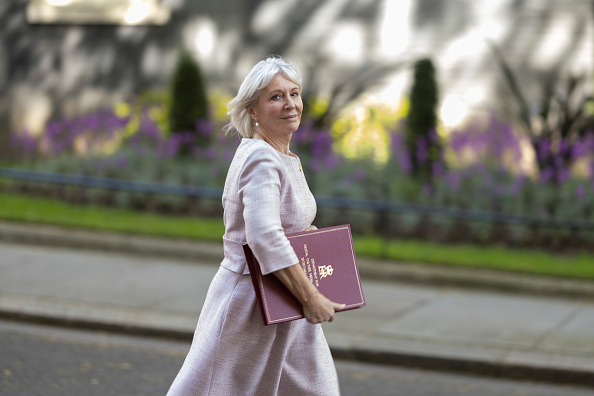Elon Musk wants free speech on Twitter? Time to meet Nadine Dorries

Doomsday is here. Democracy is dead. The uninformed bigoted swill have taken over. The reaction to the world’s richest man purchasing a microblogging platform is a sight to behold. Actress Jameela Jamil and activist Shaun King are quitting. King claimed the takeover is really “about white power”. Democratic Senator Elizabeth Warren warned it is “dangerous for our democracy”. Amnesty International have warned this could mean more “hate speech”.
Elon Musk’s bid to purchase Twitter has been accepted by the board and is expected to receive shareholder approval. But Musk’s challenges are only just beginning. It is always going to be a headache owning the global media and political elite’s favoured social media platform. This is made even more difficult by the goal to deliver “an inclusive arena for free speech,” as Musk said last week at the TED conference in Vancouver.
The foremost problem with Musk’s vision is that very few truly believe in free speech. There’s a tendency across the political spectrum to demand censorship of unfavoured opinions. We hear every day that X is not free speech, it’s hate speech, disinformation or grooming. Republican Florida governor Ron DeSantis is banning discussions about sexuality and critical race theory in classrooms. The UK’s shadow culture secretary Lucy Powell has called for more action on “climate denial” and “incels” on the internet. Every interest group, from farmers grouchy about harassment from vegans, footballers wanting less anonymous trolls to parliamentarians complaining about online abuse from constituents, has their demands.
This puts Twitter in a bind. There’s around 500 million tweets per day. It’s extremely difficult to identify what is unlawful or against policies, and apply that in a consistent manner – particularly considering Silicon Valley’s left liberal groupthink tendencies. Then there’s new pressure to remove speech, like the European Union’s forthcoming Digital Service Act. There are obvious moronic cases. Like banning Donald Trump while leaving the Taliban and Putin’s spokespeople online. But many moderation decisions are difficult and contested.
Musk should be congratulated for indicating that the platform will lean on the side of freedom. A greater ability to share ideas could help spark some new life into the platform. If people are unhappy with this situation, as many said previously when Twitter more heavily censored, they can always sign off and not return.
But this vision is going to run into an immediate roadblock not only in the European Union, where regulators have already warned that Twitter must follow their rules, but also in the United Kingdom. If Musk thought finding financing would be the most complicated part of the Twitter deal, he hasn’t met Nadine Dorries.
The UK’s Online Safety Bill is incompatible with operating a free speech platform. It will require platforms to proactively monitor and remove various types of unlawful speech, including “hate speech”. They will also have to remove anything that could cause serious distress to a likely audience, under the new harmful communications offence. There will also be duties around “legal but harmful” speech, expected to include “disinformation”. Taken together, it will empower the easily offended and malicious actors to push for removal of speech.
Despite claims from Dorries, and the weak duty to “have regard” for free expression, the Bill is designed to encourage censorship. For example, a normal “hate crime” proceeding would require approval from the Attorney General’s Office and a criminal trial. By contrast, Twitter will be expected to proactively remove hate speech merely if they “reasonably consider” it to be illegal, without a criminal investigation or conviction. This is well below the usual “beyond reasonable doubt” criminal standard. If Musk fails to comply, Twitter will be investigated by Ofcom and could face multibillion pound fines.
In theory Twitter could shut down their office in London and stop offering advertising to UK businesses. But if British users can continue to access the site they could still be covered. Musk could face a large fine or criminal action were he to step foot in the UK. The only way to entirely avoid the regulatory risk would be to block UK users from accessing Twitter. Indeed, many smaller overseas platforms will likely take this option to avoid the costs and risks. There is historical precedent. Over 1,000 news websites blocked UK and EU users after the introduction of the GDPR to avoid non-compliance.
Musk may have already sparked much furore, but it’s only just beginning.